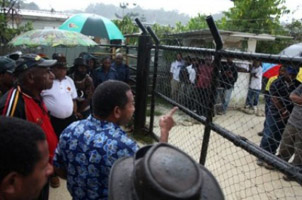
Special Correspondent
PORT MORESBY: There are fears that a multi-billion dollar liquefied natural gas (LNG) project in Papua New Guinea (PNG) could lead to social unrest: Just one year into the four-year construction phase of the project there are some ominous signs, observers say.
Outside the capital Port Moresby near the LNG plant site, young men employed by Esso Highlands (a subsidiary of ExxonMobil), the company running the project, guzzle their earnings, disrupting Sunday church with rowdy drunkenness, while in a nearby village, five people were recently killed in a land dispute, according to an independent social and environmental compliance monitoring report.
“While there’s potential for positive access to resources for funds for development, there’s also the potential to exacerbate conflict as we have seen in the past in Bougainville and in other countries that have a natural resource boom,” said Jock Paul, a humanitarian affairs officer with the UN Office for the Coordination of Humanitarian Affairs.
The investment for the initial phase of the project is estimated at US$15 billion, while over three decades, PNG is expected to reap US$5.6-7.5 billion from the project, says ExxonMobil.
Less than $1 a day
About 40 percent of PNG’s 6.6 million inhabitants live on less than $1 a day, according to AusAid, the Australian government agency responsible for overseas aid.
“More money will help us with education, livelihoods and housing, but it’s also bringing about jealousy, ill feelings and discomfort in the community,” a local Esso community affairs officer told IRIN on condition of anonymity.
The country - about the size of Sweden - boasts a wealth of natural resources and one of the world’s most culturally diverse populations, with some 800 indigenous languages. Its tribes own 97 percent of the country’s land through customary land tenure.
But tribal diversity and land ownership issues, combined with widespread corruption, have long proven difficult obstacles for companies involved in resource extraction.
On the north-eastern island of Bougainville, an autonomous region within PNG, disputes between landowners and the international owners of a copper mine led to a 10-year civil war which ended in 1997. Thousands lost their lives, and the mine, which closed in 1989, remains shut today.
Some worry that PNG’s LNG project could meet a similar fate.
'Resource curse'
However, many believe the project - the country’s largest natural resource development project to date - bodes well for the country’s economic future.
“There’s an enormous amount of wealth that Papua New Guinea will accrue as a result of this resource. We all know about the resource curse, where countries extract their natural resources and the standard of living does not improve for the people,” US ambassador Teddy Taylor told IRIN.
During a visit in November, US Secretary of State Hillary Clinton offered technical training for scientists and engineers from PNG.
“Our initiative is designed to help the government manage natural and financial resources,” Taylor said. “It’s to help the lives of people improve as the wealth of the nation grows.”
Australia is advising PNG as it sets up a sovereign wealth fund for LNG revenue, with the first fuel exports expected in 2014.
“As they remove their asset from the ground, they have to convert it to another asset for future generations,” David Murray, chairman of Australia's Future Fund Board of Guardians, recently told PNG’s business community.
Information gap
On the local level, people have yet to understand how to handle the LNG windfall.
“We are not business-minded people. We are subsistence farmers. This is all new to us,” said the Esso community affairs officer.
Many young men, who earned $150-190 every two weeks during the project’s early days, spent it all within days on alcohol.
“I see them feeling sorry for themselves.” I say, ‘Now you see the fruit of what you did five weeks ago when you were earning big money. Now you’re sitting like stupids, feeling hungry,’” the Esso community worker said.
Another Esso employee, also speaking on condition of anonymity, joined the company in the hope of changing things, after hearing about men earning LNG money and neglecting their families. She was surprised to find a company trying its best to do things right.
“ExxonMobil was interested in making sure the people got information, and the people’s concerns and issues were addressed. It’s not because I’m employed by them that I’m saying this,” she said.
Still, confusion remains, according to James Laki, of the local NGO, Peace Foundation Melanesia. For example, some communities are receiving funding as project grants, rather than cash in hand, but the government has failed to get that point across.
“The government is doing all it can to minimise conflict,” Laki said. “The main problem is the information gap between and among all stakeholders. This is made more difficult with the high illiteracy rate.” - IRIN Humanitarian News/Pacific Media Watch
* Note: This report does not necessarily reflect the views of the United Nations.



